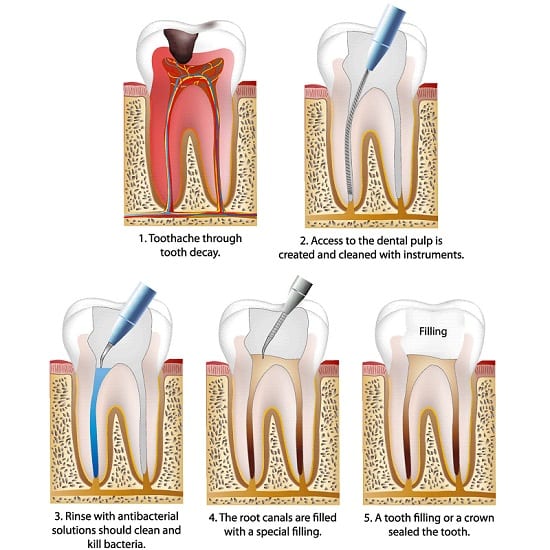Chances are that you or a family member have been told that a root canal is necessary to save a tooth. Or perhaps root canal therapy is already underway. In either case, it’s important that you understand what will happen during root canal treatment and why this procedure is necessary to save the tooth.
What Is Root Canal Therapy?
Root canal therapy (endodontics) treats disorders of the nerve (pulp) of the tooth. In the past before modern dentistry, teeth with diseased or infected nerves were extracted and removed frequently. In 95% of these cases today, teeth no longer need to be pulled by a dentist. At Hancock and Johnston, we strive to preserve our patient’s teeth and we will make every effort to save yours!

Why Do I Need A Root Canal?
There are several reasons root canals become an emergency dental procedure. The most common are:
- Trauma – a physical blow to teeth or a constant teeth grinding condition that creates conditions for a root canal.
- Physical irritation – deep decay or a very large filling
Regardless of the initial cause, the tooth pulp becomes irritated and an abscess (infection) occurs. Bacteria from your saliva grow within the tooth pulp, causing pressure and pain. In some, a patient may experience facial swelling. Eventually the pulp dies, causing the bone around the tooth to be destroyed.
Root Canal Surgery
Once it has been determined (with X-rays and clinical examination) that root canal treatment is necessary, you will be scheduled for one or more appointments. It’s important that you keep these appointments, in order to prevent delays in treatment and healing. It’s also essential that you take all antibiotics and medications prescribed, to hasten healing and reduce swelling. Should you experience pain that cannot be controlled with the prescribed medication (this is unusual, but a precaution) call our office immediately.
Here’s how your tooth can be saved with endodontic treatment.
- First, the tooth may be isolated with a piece of rubber dam. This confines the treatment area and protects the mouth from bacteria. With the infected tooth numb, a dentist will drill an opening through the crown into the pulp.
- We then carefully remove the diseased pulp. The root canal area inside your tooth is cleaned, enlarged and shaped. Then, depending on your individual case, the root canal(s) and pulp chamber may be permanently filled and sealed. For some patients, we place a temporary medication in the tooth to control bacterial growth and reduce infection.
- A temporary filling is placed in the opening of the tooth until the next visit. In some cases, however, the tooth may be left open. This allows the infection to drain.
- At the next appointment we sterilize the inside of the tooth, to remove the bacteria. Throughout the root canal procedure we take X-rays to confirm all infected pulp is removed and that the walls inside the canal are smooth.
- The root canal and pulp chamber are permanently filled and sealed.
- Finally, the tooth is fully restored to chewing function. This may include a crown to reinforce the treated tooth.
Care Following Treatment
Once the root canal treatment has been completed, you should be aware of the following considerations:
- Discoloration: You may notice that your endodontically treated tooth (particularly a front tooth) has undergone a change in color. While this is of no great medical concern, you may be interested in having the tooth bleached or whitened. Be sure to ask us about teeth bleaching;
- Brittleness – A non-vital (endodontically treated) tooth is more brittle than a vital one, and is more susceptible to fracture. Therefore, we recommend that your root canal tooth be crowned (capped) following treatment. Ask us if you are considering having this done.
If You Have Further Questions

We encourage all patients to research treatment options. However, if you need a root canal and are currently experiencing a toothache, time is not on your side. Do not delay treatment for weeks or months without understanding the repercussions. Ask our dentists followup questions either on the phone or in office.
We believe in saving teeth (instead of removing them) and we will make every effort to save yours!

